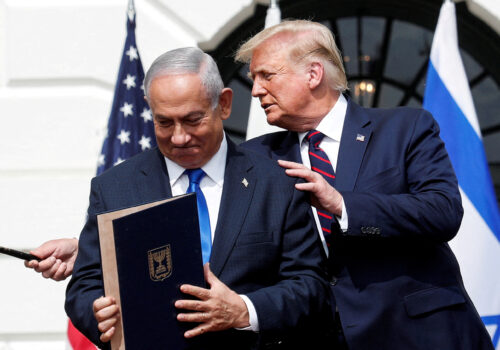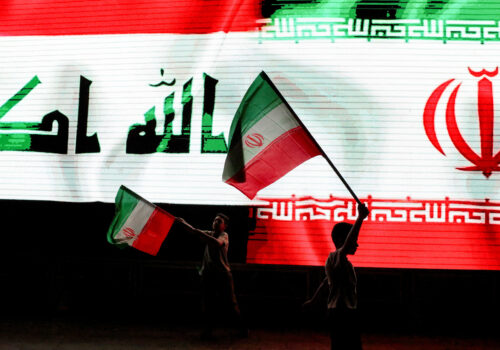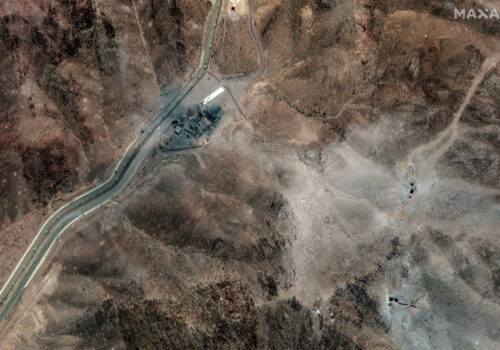Opportunity knocks on Netanyahu’s US visit after Israel-Iran war
“I’m not going to start a war, I’m going to stop wars,” US President Donald Trump pledged after recapturing the Oval Office last November. That’s much easier said than done.
In fact, the “Complete and Total CEASEFIRE” between Israel and Iran, which he heralded in a Truth Social post on the evening of June 23, was violated almost immediately after entering into force. Time will tell whether it holds—or not—and whether it might be parlayed into a more stable and permanent reality.
The first key to any sustainable peace is a plausible exit strategy. Parties to conflict will refuse to bury their (literal) hatchets absent a rationale that paints that alternative as most sensible. Over thirty-five years ago, in 1988, then-Supreme Leader Ayatollah Ruhollah Khomeini elected to “drink from the poison chalice” and terminate Iran’s war with neighboring Iraq, citing “events and factors that . . . will become clear in the future, and considering the opinions of all the country’s high-level political and military experts.”
However—and notwithstanding Trump’s demand for “unconditional surrender”—the current Iranian standoff with Israel may be ripe for a more mutually satisfying equilibrium.
SIGN UP FOR THIS WEEK IN THE MIDEAST NEWSLETTER
It would have been an increasingly hazardous proposition for Iran, Israel, and the United States—the three main protagonists in this fight—to continue combat operations. For Iran, it could have meant the assassination of its current supreme leader, Ayatollah Ali Khamenei, and ultimately, the overthrow of the regime. For Israel, where senior defense officials attested that their bank of Iranian nuclear targets was near exhaustion, it could have spelled a ruinous war of attrition and loss of international legitimacy to engage in kinetic self-defense against Iranian aggression. The United States, meanwhile, remains spooked by the potential for getting stuck in a new Iraq-like quagmire, a particularly unpalatable fate to Trump’s “Make America Great Again” supporters.
Instead, all three countries are pivoting to a series of accomplishments—some more credible than others, to be sure—that offer them solid ladders from which to climb down off their warhorses. Those parallel narratives facilitate moving their respective publics toward de-escalation.
Tehran is proclaiming defiantly, first and foremost, that the Islamic Republic has survived the combined forces of the United States and Israel. Moreover, to quote the words of a top advisor to the Supreme Leader, it boasts that “even if nuclear sites are destroyed, [the] game isn’t over [since] enriched materials, indigenous knowledge [and] political will remain” in Iran’s charge. Official spokesmen are also highlighting the injury inflicted by Iranian missile barrages on major cities and sensitive installations across Israel, and their retaliatory muscle—albeit symbolic—against US assets at the al-Udeid airbase in Qatar. Future benefits could, if progress is realized toward a deal, include sanctions relief.
In Jerusalem, Prime Minister Benjamin Netanyahu’s government is likewise celebrating its own substantial inventory of feats. The elimination of numerous Iranian nuclear scientists, augmented by multiple airstrikes against Iran’s primary nuclear sites at Fordow, Natanz, and Esfahan, has devastated—Trump would argue “obliterated”—its efforts to acquire a nuclear weapons capacity for the foreseeable future, at least. The same holds true for Iran’s ballistic missile production and other critical infrastructures. Precision attacks by Israel against an array of military and Revolutionary Guard (IRGC) commanders, as well Iran’s defensive missile and radar arrays, have crippled Iran’s command and control apparatus and afforded Israel supremacy over Iranian airspace. Earlier downgrades of Iranian proxies, Hezbollah and Hamas, severely compromised Tehran’s plans to challenge Israel’s home front.
No less important for Israel is the political windfall of recent events. Rebounding from a notorious rocky patch in his personal relationship with Trump, Netanyahu has astounded the world by the depth of Israel’s coordination with the White House. The president’s testimony that he and the prime minister “worked as a team like perhaps no team has ever worked before” in executing last month’s US B-2 bombing mission will bolster Israel’s global standing and deter its enemies. Additionally, it will promote the cause of expanding the Trump-sponsored Abraham Accords—which, in another success, have braved this war intact—to encompass other regional actors, such as Saudi Arabia, Lebanon, and Syria. Riyadh has indicated that it won’t normalize relations with Israel until the Gaza war is ended and a pathway is forged for Palestinian statehood.
Finally, from Washington’s perspective, Pax Americana is back on the ascent after a period of malaise among previously disenchanted US allies in the Middle East who had begun hedging bets with Russia and China. Trump is taking credit for the “historic moment” of the US raid on Iranian targets—”we are the only ones who have the capability to do it,” he said on June 18—and also touting the triumph of his “peace through strength” doctrine, through which he anticipates now to usher in an era of peace between Iran and Israel. Dialogue will ensure that, as he intended, Washington’s foray was a one-time affair. Steve Witkoff, Trump’s Special Envoy to the Middle East, continues to communicate “both directly and indirectly” with Iranian officials. The TACO (Trump Always Chickens Out) moniker, which got under Trump’s skin, has been definitively excised from the lexicon.
The second key—which Iran, Israel, and the United States are still fumbling with—rests in the transition from limbo to actual understandings that aim to enshrine that state of calm. Obstacles abound, and the confidence deficit between them is gargantuan. Middle ground will not be found easily, if at all, on issues such as the whereabouts and future of any highly enriched uranium still in Iran’s custody, and limits on further Iranian enrichment activity and ballistic missile development. Additional unknowns include the possible existence of secret Iranian nuclear facilities and the extent to which Trump will stay involved in seeing this project through to fruition. But leaving the situation fluid, with no concrete benchmarks and subject only to the vicissitudes of posts on social media, is a recipe for explosive chaos.
Under prevailing circumstances, this route—albeit fraught with barriers—presents the opportunity for all sides to declare victory and start concentrating on other imperatives. Iran and Israel can move on to repair the physical and emotional damage wreaked by their havoc on each other. And the United States can devote its energies to disentangling itself from Middle East wars, advancing a program to rehabilitate Gaza and release the hostages, and contending with Russia and China. Trump might yet win the Nobel Prize he covets after all.
Matters could come to a head this week, when Netanyahu visits the White House. Expectations are running high that Trump, after coming to Israel’s succor opposite Iran, may demand from the prime minister that he “MAKE THE DEAL IN GAZA. GET THE HOSTAGES BACK,” in keeping with Trump’s June 29 edict. Netanyahu, who is signalling acceptance of a proposed sixty-day truce in the Gaza Strip, could wind up between a rock and a hard place, being compelled to choose between a volatile president and his own political survival: Obliging Trump could spell the end of his ruling coalition—many of whose members adamantly reject the idea of any halt in the war on Hamas—but snubbing him could translate into the withdrawal of vital US support, at a time when the confrontation with Tehran could still flare-up.
Israel’s premier will have to navigate this minefield with utmost caution. The optimal path forward is a “distrust, but verify” resolution to the Iran conflict that diminishes its corrosive impact on adjacent theaters. Strict monitoring and enforcement protocols will need to be instituted, along with conditions for the resumption of hostilities if this process collapses. But negotiations are the least of all evils by far. They carry the hope of an antidote to the poison chalice.
Shalom Lipner is a nonresident senior fellow of the Scowcroft Middle East Security Initiative at the Atlantic Council. From 1990 to 2016, he served seven consecutive Israeli premiers at the Prime Minister’s Office in Jerusalem. X: @ShalomLipner
Further reading
Thu, Jul 3, 2025
Three Abraham Accords goals Trump should raise with Netanyahu
MENASource By Allison Minor
Between Iran and Gaza, Trump and Netanyahu will have a full agenda during the latter’s visit to Washington.
Mon, Jun 30, 2025
Balancing acts and breaking points: Iraq’s US-Iran dilemma
MENASource By C. Anthony Pfaff
The future of US–Iraq relations is neither as dim as it may first appear, nor as promising as one might hope.
Thu, Jun 26, 2025
What really happened to Fordow? Three possible futures for Iran’s nuclear program after US strikes.
New Atlanticist By Amir Asmar
The condition of Fordow will have a direct impact on the likelihood of Iran giving up its nuclear program versus resuming its pursuit of nuclear weapons.
Image: FILE PHOTO: Israel's Prime Minister Benjamin Netanyahu gives a statement during a visit to the site of the Weizmann Institute of Science, which was hit by an Iranian missile barrage, in the central city of Rehovot, Israel June 20, 2025. JACK GUEZ/Pool via REUTERS/File Photo


